-
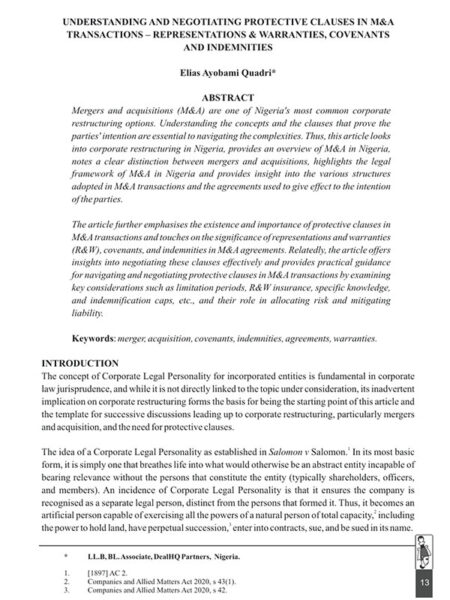
Understanding and Negotiating Protective Clauses in M&A Transactions – Representations & Warranties, Covenants & Indemnities
0₦2,500.00Elias Ayobami Quadri, in his article, Understanding and Negotiating Protective Clauses in M&A Transactions – Representations & Warranties, Covenants and Indemnities, discusses the legal effect of representation, warranties, covenants and indemnities in merger and acquisition transactions. In corporate restructurings, a clear understanding of the concepts and the clauses that evidence the intention of the parties are essential to navigating the complexities present therein. Elias looks into corporate restructuring in Nigeria, provides an overview of M&A in Nigeria, noting a clear distinction between mergers and acquisition, highlighting the legal framework of M&A in Nigeria, and providing insight into the various structures adopted in M&A transactions and the agreements used to give effect to the intention of the parties. Elias further emphasizes the existence and importance of protective clauses in M&A transactions and touches on the significance of representations and warranties (R&W), covenants, and indemnities in M&A agreements. Relatedly, Elias offers insights into negotiating these clauses effectively, and provides practical guidance for navigating and negotiating protective clauses in M&A transactions by examining key considerations such as limitation periods, R&W insurance, specific knowledge, and indemnification caps, etc., and its role in allocating risk and mitigating liability.
-
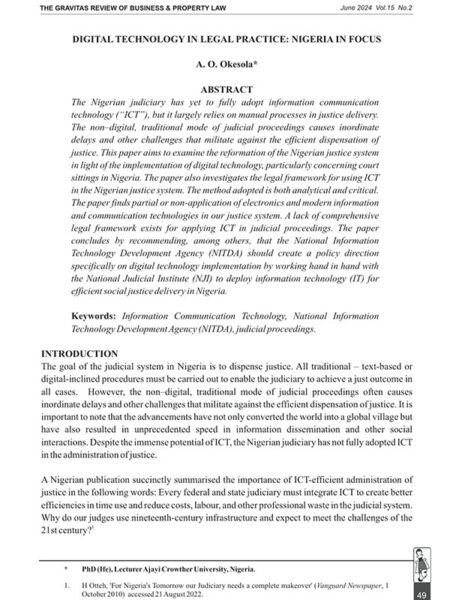
Digital Technology in Legal Practice: Nigeria in Focus
0₦2,500.00Dr. A.O. Okesola, in his article, Digital Technology in Legal Practice: Nigeria in Focus, examines the reformation of the Nigeria justice system in the light of the implementation of digital technology, particularly as it pertains to court sittings in Nigeria. Okesola also investigates the legal framework for the use of ICT in the Nigeria justice system. The method adopted is both analytical and critical. Okesola finds that there is partial or non – application of electronics and modern information and communication technologies in our justice system. There is also non – existing comprehensive legal framework for the application of ICT in judicial proceedings. Okesola concludes by recommending among others that the National Information Technology Development Agency (NITDA) should create a policy direction specifically on digital technology implementation by working hand in hand with the National Judicial Institute (NJI) to deploy information technology (IT) for efficient social justice delivery in Nigeria.
-
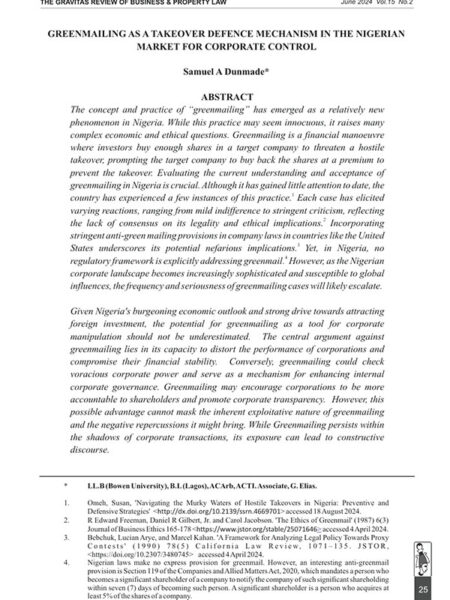
Greenmailing as a Takeover Defence Mechanism in the Nigerian Market for Corporate Control
0₦2,500.00Samuel A. Dunmade, in his article, Greenmailing as a Takeover Defence Mechanism in the Nigerian Market for Corporate Control, examines the concept and practice of “greenmailing” as a relatively new phenomenon in Nigeria. Put simply, greenmailing is a financial manoeuvre where investors buy enough shares in a target company to threaten a hostile takeover thereby prompting the target company to buy back the shares at a premium to prevent the takeover. Whilst this practice may seem innocuous on its surface, it raises a host of complex economic and ethical questions. It is crucial to evaluate the current understanding and acceptance of greenmailing in Nigeria. Although it has gained little attention to date, the country has experienced a few instances of this practice. Each case has elicited varying reactions, ranging from mild indifference to stringent criticism, a reflection of the lack of consensus on its legality and ethical implications. The incorporation of stringent anti-green mailing provisions in company laws in countries like the United States underscores its potential nefarious implications. Yet, in Nigeria, no regulatory framework is explicitly addressing greenmail. However, as the Nigerian corporate landscape becomes increasingly sophisticated and susceptible to global influences, the frequency and seriousness of greenmailing cases will likely escalate.
-
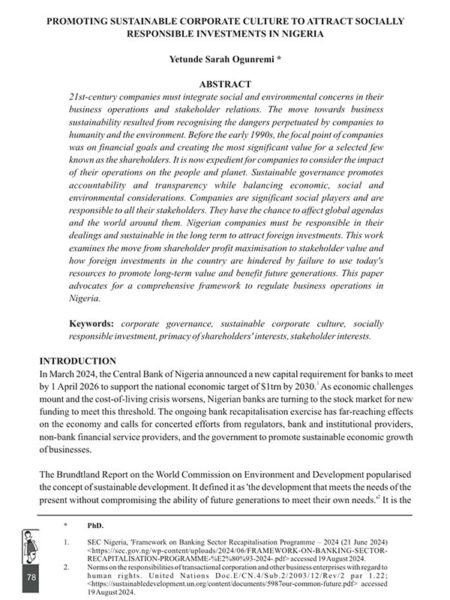
Promoting Sustainable Corporate Culture to Attract Socially Responsible Investments in Nigeria
0₦2,500.00Yetunde Sarah Ogunremi, in her article, Promoting Sustainable Corporate Culture to Attract Socially Responsible Investments in Nigeria, explores the need for companies to integrate social and environmental concerns in their business operations and stakeholder relations. The move towards business sustainability was as a result of the recognition of the dangers perpetuated by companies to humanity and the environment. Prior to the early 1990s, the focal point of companies was on financial goals and creating the greatest value for a selected few known as the shareholders. It is now expedient for companies to consider the impact of their operations on the people and planet. Sustainable governance promotes accountability and transparency while balancing economic, social and environmental considerations. Companies are significant social players and responsible to all their stakeholders. They have the chance to affect global agendas and the world around them. Nigerian companies must be responsible in their dealings and sustainable in the long term in order to attract foreign investments. Ogunremi examines the move from shareholder profit maximization to stakeholder value and how foreign investments in the country are hindered by failure to use resources of today in ways that promote long term value and benefit to future generations. Ogunremi advocates for a comprehensive framework to regulate business operations in Nigeria.
-
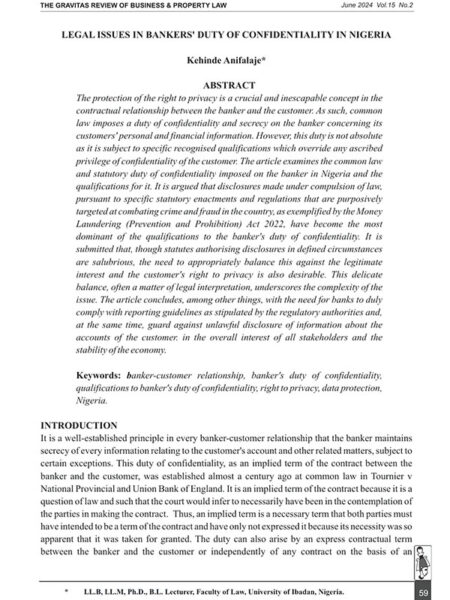
Legal Issues in Bankers’ Duty of Confidentiality in Nigeria
0₦2,500.00Dr. Kehinde Anifalaje, in his article, Legal Issues in Bankers’ Duty of Confidentiality in Nigeria, examines the common law and statutory duty of confidentiality imposed on the banker in Nigeria and the qualifications thereto. It is argued that disclosures made under compulsion of law, pursuant to specific statutory enactments and regulations that are purposively targeted at combating crime and fraud in the country, as exemplified by the Money Laundering (Prevention and Prohibition) Act 2022, have become the most dominant of the qualifications to the banker’s duty of confidentiality. Anifalaje submits that, though statutes authorising disclosures in defined circumstances are salubrious, the need to appropriately balance this against the legitimate interest and the right to privacy of the customer is also desirable. Anifalaje concludes, inter alia, with the need for banks to duly comply with reporting guidelines as stipulated by the regulatory authorities and at the same time guard against unlawful disclosure of information pertaining to the accounts of the customer in the overall interest of all stakeholders and the stability of the economy.
-
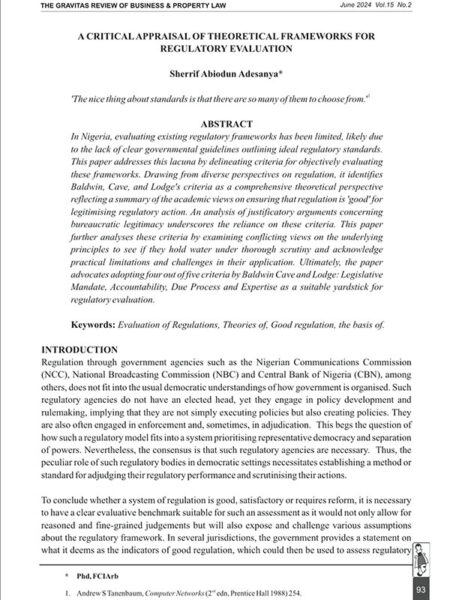
A Critical Appraisal of Theoretical Frameworks for Regulatory Evaluation
0₦2,500.00Sherrif Abiodun Adesanya, in his article, A Critical Appraisal of Theoretical Frameworks for Regulatory Evaluation, posits the need to have a theoretical basis for the evaluation of existing regulatory frameworks. Adesanya provides a set of criteria for the objective evaluation of these frameworks. Drawing from diverse perspectives on regulation, he identifies Baldwin, Cave, and Lodge’s criteria as a comprehensive theoretical perspective reflecting a summary of the academic views on how to ensure that regulation is ‘good’ for the purpose of legitimising regulatory action. An analysis of justificatory arguments concerning bureaucratic legitimacy underscores the reliance on these criteria. Adesanya analyses these criteria further by examining conflicting views on the underlying principles to see if these criteria hold water under thorough scrutiny and acknowledging practical limitations and challenges in their application. Ultimately, Adesanya advocates for the adoption of four out of five criteria put forth by Baldwin Cave and Lodge namely: Legislative Mandate, Accountability, Due Process and Expertise as a suitable yardstick for regulatory evaluation.
-

Nigerian Company and Securities Law Reports (NCSLR) 1958-2017 Volumes 1-7
0₦75,000.00Nigerian Company and Securities Law Reports (NCSLR) 1958-2017 Volumes 1-7, edited by Professor Joseph Abugu, and published by The Gravitas Legal and Business Resources Limited, is a composite compendium of superior court decisions on Corporate and Securities law.
-

The Gravitas Nigerian Tax Handbook and Statutes
0₦50,000.00The Gravitas Nigerian Tax Handbook and Statutes, written and complied by Professor Taofeeq Abdulrazaq, SAN, Theophilus Emuwa and Moshood Shehu, is a comprehensive reference work written by experienced professionals and covering major aspects of Nigerian taxation. The Handbook offers a thorough guide to Nigerian taxation.
-
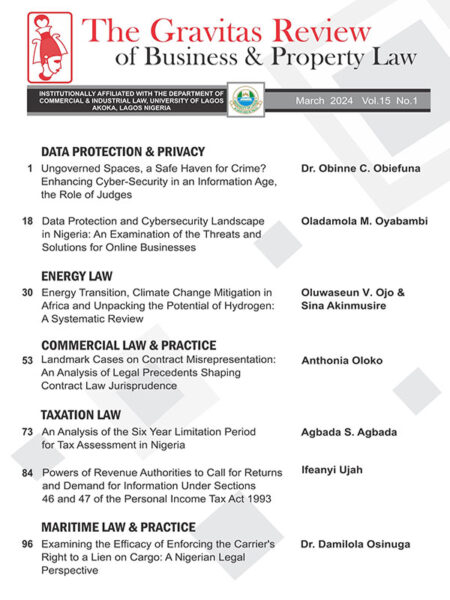
The Gravitas Review of Business & Property Law Vol.15 No.1 – Print
0₦5,000.00In this issue of The Gravitas Review of Business & Property Law Vol.15 No.1, there are well researched articles on:
- Data Protection & Privacy
- Energy Law
- Commercial Law & Practice
- Taxation
- Maritime Law
-

The Gravitas Review of Business & Property Law Vol.15 No.1 – E-Book
0₦5,000.00In this issue of The Gravitas Review of Business & Property Law Vol.15 No.1, there are well researched articles on:
- Data Protection & Privacy
- Energy Law
- Commercial Law & Practice
- Taxation
- Maritime Law
-

The Gravitas Review of Business & Property Law Vol.15 No.1
0₦5,000.00In this issue of The Gravitas Review of Business & Property Law Vol.15 No.1, there are well researched articles on:
- Data Protection & Privacy
- Energy Law
- Commercial Law & Practice
- Taxation
- Maritime Law
-
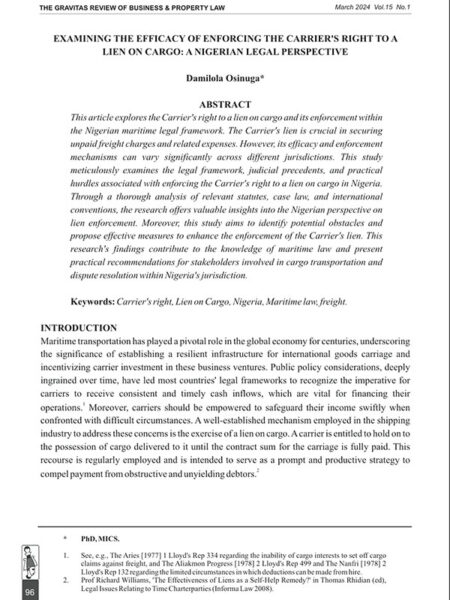
Examining the Efficacy of Enforcing the Carrier’s Right to a Lien on Cargo: A Nigerian Legal Perspective
0₦2,500.00Dr. Damilola Osinuga, in his article, Examining the Efficacy of Enforcing the Carrier’s Right to a Lien on Cargo: A Nigerian Legal Perspective, provides an in-depth exploration of the carrier’s right to a lien on cargo and its enforcement within the Nigerian maritime legal framework. The carrier’s lien plays a crucial role in securing unpaid freight charges and related expenses. However, its efficacy and enforcement mechanisms can vary significantly across different jurisdictions. Osinuga meticulously examines the legal framework, judicial precedents, and practical hurdles associated with enforcing the carrier’s right to a lien on cargo in Nigeria. Through a thorough analysis of relevant statutes, case law, and international conventions, the research offers valuable insights into the Nigerian perspective on lien enforcement. Osinuga aims to identify potential obstacles and propose effective measures to enhance the enforcement of the carrier’s lien.
The Gravitas Review of Business & Property Law



